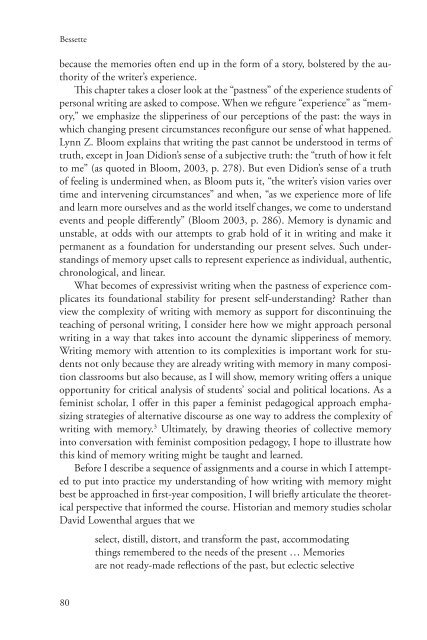Critical Expressivism- Theory and Practice in the Composition Classroom, 2014a
Critical Expressivism- Theory and Practice in the Composition Classroom, 2014a
Critical Expressivism- Theory and Practice in the Composition Classroom, 2014a
You also want an ePaper? Increase the reach of your titles
YUMPU automatically turns print PDFs into web optimized ePapers that Google loves.
Bessette<br />
because <strong>the</strong> memories often end up <strong>in</strong> <strong>the</strong> form of a story, bolstered by <strong>the</strong> authority<br />
of <strong>the</strong> writer’s experience.<br />
This chapter takes a closer look at <strong>the</strong> “pastness” of <strong>the</strong> experience students of<br />
personal writ<strong>in</strong>g are asked to compose. When we refigure “experience” as “memory,”<br />
we emphasize <strong>the</strong> slipper<strong>in</strong>ess of our perceptions of <strong>the</strong> past: <strong>the</strong> ways <strong>in</strong><br />
which chang<strong>in</strong>g present circumstances reconfigure our sense of what happened.<br />
Lynn Z. Bloom expla<strong>in</strong>s that writ<strong>in</strong>g <strong>the</strong> past cannot be understood <strong>in</strong> terms of<br />
truth, except <strong>in</strong> Joan Didion’s sense of a subjective truth: <strong>the</strong> “truth of how it felt<br />
to me” (as quoted <strong>in</strong> Bloom, 2003, p. 278). But even Didion’s sense of a truth<br />
of feel<strong>in</strong>g is underm<strong>in</strong>ed when, as Bloom puts it, “<strong>the</strong> writer’s vision varies over<br />
time <strong>and</strong> <strong>in</strong>terven<strong>in</strong>g circumstances” <strong>and</strong> when, “as we experience more of life<br />
<strong>and</strong> learn more ourselves <strong>and</strong> as <strong>the</strong> world itself changes, we come to underst<strong>and</strong><br />
events <strong>and</strong> people differently” (Bloom 2003, p. 286). Memory is dynamic <strong>and</strong><br />
unstable, at odds with our attempts to grab hold of it <strong>in</strong> writ<strong>in</strong>g <strong>and</strong> make it<br />
permanent as a foundation for underst<strong>and</strong><strong>in</strong>g our present selves. Such underst<strong>and</strong><strong>in</strong>gs<br />
of memory upset calls to represent experience as <strong>in</strong>dividual, au<strong>the</strong>ntic,<br />
chronological, <strong>and</strong> l<strong>in</strong>ear.<br />
What becomes of expressivist writ<strong>in</strong>g when <strong>the</strong> pastness of experience complicates<br />
its foundational stability for present self-underst<strong>and</strong><strong>in</strong>g? Ra<strong>the</strong>r than<br />
view <strong>the</strong> complexity of writ<strong>in</strong>g with memory as support for discont<strong>in</strong>u<strong>in</strong>g <strong>the</strong><br />
teach<strong>in</strong>g of personal writ<strong>in</strong>g, I consider here how we might approach personal<br />
writ<strong>in</strong>g <strong>in</strong> a way that takes <strong>in</strong>to account <strong>the</strong> dynamic slipper<strong>in</strong>ess of memory.<br />
Writ<strong>in</strong>g memory with attention to its complexities is important work for students<br />
not only because <strong>the</strong>y are already writ<strong>in</strong>g with memory <strong>in</strong> many composition<br />
classrooms but also because, as I will show, memory writ<strong>in</strong>g offers a unique<br />
opportunity for critical analysis of students’ social <strong>and</strong> political locations. As a<br />
fem<strong>in</strong>ist scholar, I offer <strong>in</strong> this paper a fem<strong>in</strong>ist pedagogical approach emphasiz<strong>in</strong>g<br />
strategies of alternative discourse as one way to address <strong>the</strong> complexity of<br />
writ<strong>in</strong>g with memory. 3 Ultimately, by draw<strong>in</strong>g <strong>the</strong>ories of collective memory<br />
<strong>in</strong>to conversation with fem<strong>in</strong>ist composition pedagogy, I hope to illustrate how<br />
this k<strong>in</strong>d of memory writ<strong>in</strong>g might be taught <strong>and</strong> learned.<br />
Before I describe a sequence of assignments <strong>and</strong> a course <strong>in</strong> which I attempted<br />
to put <strong>in</strong>to practice my underst<strong>and</strong><strong>in</strong>g of how writ<strong>in</strong>g with memory might<br />
best be approached <strong>in</strong> first-year composition, I will briefly articulate <strong>the</strong> <strong>the</strong>oretical<br />
perspective that <strong>in</strong>formed <strong>the</strong> course. Historian <strong>and</strong> memory studies scholar<br />
David Lowenthal argues that we<br />
select, distill, distort, <strong>and</strong> transform <strong>the</strong> past, accommodat<strong>in</strong>g<br />
th<strong>in</strong>gs remembered to <strong>the</strong> needs of <strong>the</strong> present … Memories<br />
are not ready-made reflections of <strong>the</strong> past, but eclectic selective<br />
80


















